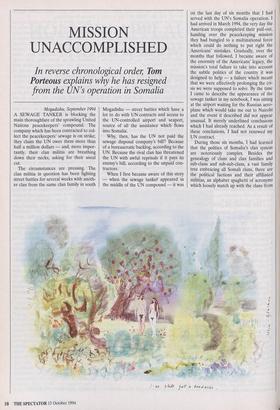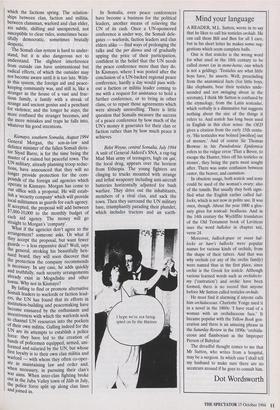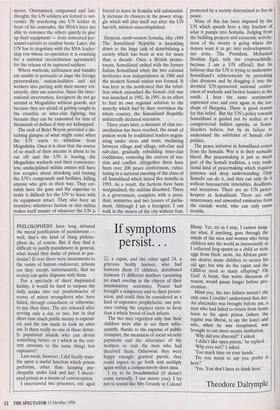MISSION UNACCOMPLISHED
In reverse chronological order, Tom Porteous explains why he has resigned
from the UN's operation in Somalia
Mogadishu, September 1994 A SEWAGE TANKER is blocking the main thoroughfare of the sprawling United Nations peacekeepers' compound. The company which has been contracted to col- lect the peacekeepers' sewage is on strike; they claim the UN owes them more than half a million dollars — and, more impor- tantly, their clan militia are breathing down their necks, asking for their usual cut.
The circumstances are pressing. The clan militia in question has been fighting street battles for several weeks with anoth- er clan from the same clan family in south Mogadishu — street battles which have a lot to do with UN contracts and access to the UN-controlled airport and seaport, source of all the assistance which flows into Somalia.
Why, then, has the UN not paid the sewage disposal company's bill? Because of a bureaucratic backlog, according to the UN. Because the rival clan has threatened the UN with awful reprisals if it pays its enemy's bill, according to the unpaid con- tractors.
When I first became aware of this story — when the sewage tankef appeared in the middle of the UN compound — it was
on the last day of six months that I had served with the UN's Somalia operation. I had arrived in March 1994, the very day the American troops completed their pull-out, handing over the peacekeeping mission they had bungled to a multinational force which could do nothing to put right the Americans' mistakes. Gradually, over the months that followed, I became aware of the enormity of the Americans' legacy, the mission's total failure to take into account the subtle politics of the country it was designed to help — a failure which meant that we were effectively prolonging the cri- sis we were supposed to solve. By the time I came to describe the appearance of the sewage tanker in my notebook, I was sitting at the airport waiting for the Russian aero- plane which would take me out to Nairobi and the event it described did not appear unusual. It merely underlined conclusions which I had already reached. As a result of these conclusions, I had not renewed my UN contract.
During those six months, I had learned that the politics of Somalia's clan system are notoriously complex. Besides the genealogy of clans and clan families and sub-clans and sub-sub-clans, a vast family tree embracing all Somali clans, there are the political factions and their affiliated militias, an alphabet spaghetti of acronyms which loosely match up with the clans from which the factions spring. The relation- ships between clan, faction and militia, between clansman, warlord and clan elder, are subtle, shifting and unexpected, not susceptible to clear rules, sometimes beau- tifully democratic, sometimes brutally despotic.
The Somali clan system is hard to under- stand, but it is also dangerous not to understand. The slightest interference from outside can have unintentional but radical effects, of which the outsider may not become aware until it is too late. With- in this system, the foreign aid and peace- keeping community was, and still is, like a stranger in the house of a vast and frac- tious family, a family with a streak of strange and ancient genius and a penchant for violence; and the longer he stays, the more confused the stranger becomes, and the more mistakes and traps he falls into, whatever his good intentions.
Kismayo, southern Somalia, August 1994 General Morgan, the son-in-law and defence minister of the fallen Somali dicta- tor Siyad Barre, is for the time being the master of a ruined but peaceful town. The UN military, already planning troop reduc- tions, have announced that they will no longer provide protection for the com- pounds of the foreign aid agencies which operate in Kismayo. Morgan has come to our office with a proposal. He will estab- lish a 'security company' which will provide local militiamen as guards for each agency. If accepted, the proposal will add between $7,000-10,000 to the monthly budget of each aid agency. The money will go straight to Morgan's 'company'. What if the agencies don't agree to the arrangement? someone asks. Or what if they accept the proposal, but want fewer guards — a less expensive deal? Well, says the general, stroking his beautifully hen- naed beard, they will soon discover that the protection the company recommends is necessary. In any case, he adds quickly and truthfully, such security arrangements already exist in Mogadishu and other towns. Why not in Kismayo? By failing to find or promote alternative Somali leaders to warlords or faction lead- ers, the UN has found that its efforts in institution-building and peacemaking have become ensnared by the enthusiasm and inventiveness with which the warlords seek to channel UN resources into the pockets of their own militia. Galling indeed for the UN are its attempts to establish a police force: they have led to the creation of bands of policemen equipped, armed, uni- formed and salaried by the UN, but whose first loyalty is to their own clan militia and warlord — with whom they often co-oper- ate in maintaining law and order and, when necessary, in pursuing their clan's war aims. When inter-clan fighting broke i out in the Juba Valley town of Jilib in July, the police force split up along clan lines and joined in. In Somalia, even peace conferences have become a business for the political leaders, another means of relieving the UN of its cash. Once a UN-sponsored conference is under way, the Somali dele- gates — warlords, faction leaders and clan elders alike — find ways of prolonging the talks and the per diems and of gradually upping the price of their participation, confident in the belief that the UN needs the peace conference more than they do. In Kismayo, where I was posted after the conclusion of a UN-backed regional peace conference, hardly a day would pass with- out a faction or militia leader coming to me with a request for assistance to hold a further conference, or to bring in other clans, or to repair those agreements which were already unravelling. There is little question that Somalis measure the success of a peace conference by how much of the UN's money it generates for their clan or faction rather than by how much peace it achieves.
Belet Weyne, central Somalia, July 1994 A unit of General Aideed's SNA, a rag-tag Mad Max army of teenagers, high on qat, the local drug, appears over the horizon from Ethiopia. The young fighters are clinging to trucks mounted with strange and lethal weaponry including anti-aircraft batteries horizontally adjusted for bush warfare. They drive out the inhabitants, members of a rival clan, and sack the town. Then they surround the UN military base, triumphantly parading their plunder, which includes tractors and an earth- mover. Outmanned, outgunned and Out- thought, the UN soldiers are forced to sur- render. By murdering one UN soldier in front of his comrades, the SNA's boys are able to convince the others quietly to give up their equipment — from armoured per- sonnel-carriers to combat boots. Later, the UN has to negotiate with the SNA leader- ship (on whose co-operation it is counting for a national reconciliation agreement) for the release of its captured soldiers.
Where warlords, militiamen and bandits are unable to persuade or dupe the foreign peacemakers, nation-builders and aid workers into parting with their money vol- untarily, they use coercion. Since the inter- national intervention, foreigners do not go around in Mogadishu without guards, not because they are afraid of getting caught in the crossfire or inter-clan fighting, but because they can be ransomed for tens of thousands of dollars if they are kidnapped.
The sack of Belet Weyne provided a dis- turbing glimpse of what might come when the UN starts to withdraw from Mogadishu. Once it is clear that the source of so much of their income is about to be cut off and the UN is leaving, the Mogadishu warlords and their conscience- less, undisciplined militia armies will have few scruples about attacking and looting the UN's compounds and facilities, killing anyone who gets in their way. They cer- tainly have the guns and the expertise to make it difficult for the UN to leave with its equipment intact. They also have an incentive: whichever faction or clan militia makes itself master of whatever the UN is forced to leave in Somalia will substantial- ly increase its chances in the power strug- gle which will play itself out after the UN has left, mission unaccomplished.
Hargeisa, north-western Somalia, May 1994 The Somaliland Republic is knuckling down to the huge task of demobilising a society which has been at war for more than a decade. Once a British protec- torate, Somaliland united with the former Italian Somaliland when the two colonial territories won independence in 1960 and the modern Somali nation was formed. It was here in the north-west that the rebel- lion which unleashed the Somali civil war was launched in 1982. In 1991, in an effort to find its own regional solution to the anarchy which had by then overtaken the whole country, the Somaliland Republic unilaterally declared secession.
Three years later, a measure of clan rec- onciliation has been reached, the result of patient work by traditional leaders negoti- ating under trees and tents, mediating between village and village, sub-clan and sub-clan, gradually rebuilding inter-clan confidence, removing the sources of ten- sion and conflict. Altogether there have been over 200 peace conferences, culmi- nating in a national meeting of the clans of all Somaliland which lasted five months in 1993. As a result, the factions have been marginalised, the militias disarmed. There is a government, complete with a presi- dent, ministries and two houses of parlia- ment. Although I am a foreigner, I can walk in the streets of the city without fear, protected by a society determined to live in peace.
None of this has been imposed by the UN which spends here a tiny fraction of what it pumps into Somalia. Judging from the building projects and economic activity, most of the money is going where the donors want it to go: into redevelopment, not arms. The President, Mohamed Ibrahim Egal, tells me (reproachfully, because I am a UN official) that he believes that the UN is trying to undermine Somaliland's achievements by provoking clan divisions and by dragging it into the doomed UN-sponsored national confer- ences of warlords and faction leaders in the south. I hear the same sentiments expressed over and over again in the tea- shops of Hargeisa. There is good reason for this belief. But the UN's policy towards Somaliland is guided not by malice or a conspiratorial hidden agenda, as Soma- Wanders believe, but by its failure to understand the subtleties of Somali clan politics.
The peace initiative in Somaliland comes from the Somalis. War is in their nomadic blood. But peacemaking is just as much part of the Somali tradition, a very tradi- tional kind of peacemaking which requires patience and deep understanding. Only Somalis can do it, and they can only do it without bureaucratic timetables, deadlines, and incentives. There are no UN peace- keepers in Somaliland. There are only unnecessary and unwanted emissaries from the outside world, who can only cause trouble.




























































 Previous page
Previous page